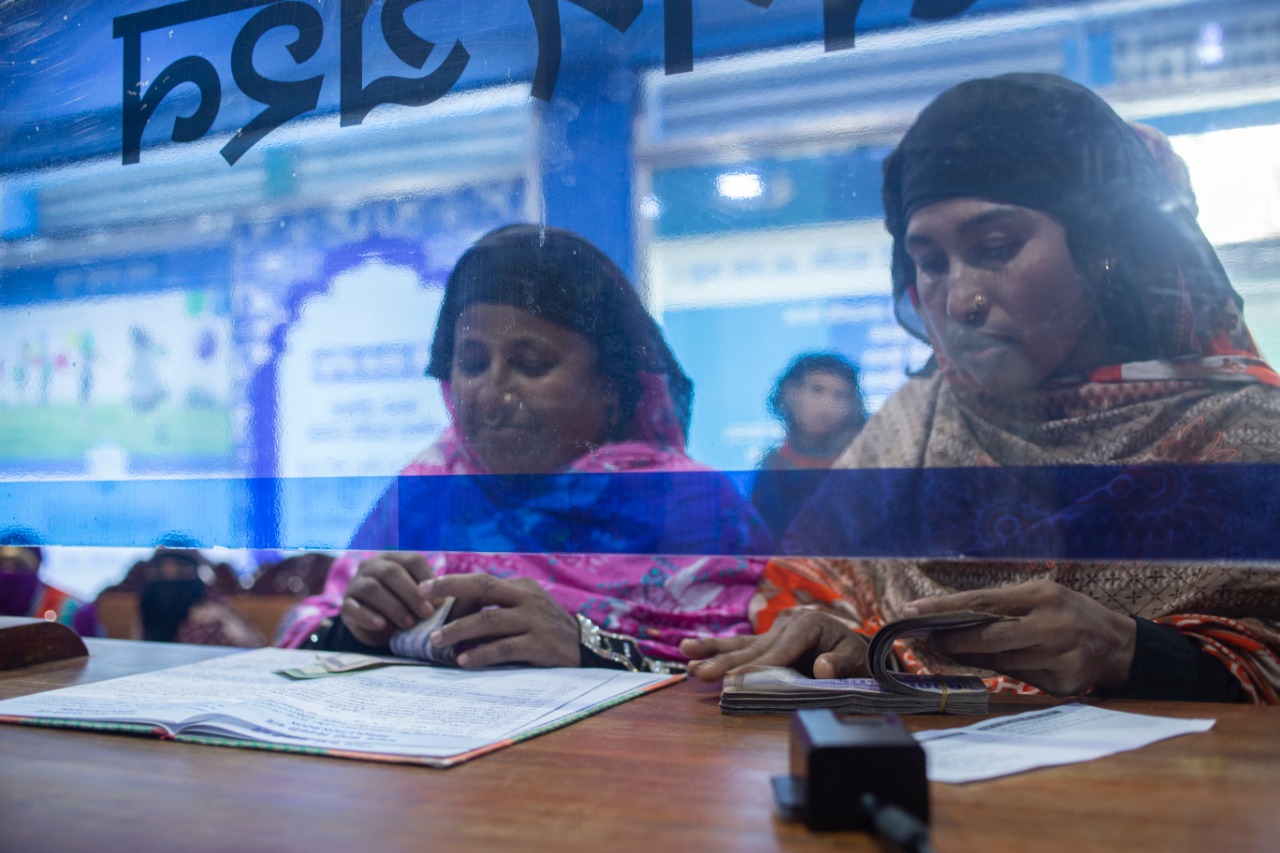Residing in the Tildanga Union of Dacope Upazila in the climate-prone coastal division of Khulna, Aarti Sana (38), has been fighting an unfair battle with climate calamities. Khulna division which is located in the southern coastal belt of Bangladesh was once renowned for its bumper lush golden rice harvests. Naturally, most of the residents of this region made a living from agricultural rice cultivation. However, with the rising climate calamities, unprecedented flash floods, increased rainfalls, salinity intrusion in water along with cyclones and hurricanes occurring at regular intervals- the lush golden rice paddies have turned into endless stretches of barren land.
This is the same for the majority of the coastal areas where its residents like Aarti and her family depend largely on natural resources for economic survival. As resources get depleted or destroyed due to climate calamities, so do their livelihoods which pushes them into deeper pockets of poverty.
“We are extremely fearful about taking any risks in agriculture, but we have no option other than agriculture. We are left with no or minimal income and struggle to make ends meet. We take one step forward, we get pushed back by ten steps each time there is a storm. It disrupts our lives and livelihoods and we feel threatened,” she said.
Poor people like Aarti and her family who have little to no land are more vulnerable to such uncertainty, increasing their displacement potential. There are minimal resources or funding mechanisms available to pursue alternative livelihoods or generate income.
According to the Global Climate Risk Index (CRI), Bangladesh lost 11,450 people, suffered economic losses worth $3.72 billion and witnessed 185 extreme weather events due to climate change. This subsequently helps the poverty cycle stay in effect, highlighting a clear link between climate change and poverty in Bangladesh.
To ensure that the most climate vulnerable women have the necessary resources, finances and capacity to build their resilience against climate change, LoGIC has opened bank accounts for each individual beneficiary to permanently include them within a financing system. The project is a joint initiative of the Government of Bangladesh, European Union (EU), Sweden, United Nations Development Programme (UNDP), and United Nations Capital Development Fund (UNCDF).
Additionally, the project is providing a Community Resilience Fund (CRF) to each of those individual bank accounts as start-up capital to alternate climate adaptive livelihoods. Moreover, the beneficiaries are trained to utilize their bank accounts most efficiently, conduct transactions, use existing financing mechanisms available at banks to strengthen their climate adaptive business models even further moving forward.
Opening a bank account is a beginning of a new chapter for most of these women. This is not merely a bank account but an identity for them– the very first step to their empowerment and a mechanism to be resilient to climate calamities.
“I am the only one in my family who has a bank account under their name. Every time I go to the bank, sign and deposit cheques, it fills my heart with pride and a sense of accomplishment, said Rikta Roy, bank account holder from Tildanga Union.
The beneficiaries are introduced to the many advantages of engaging into a formalized banking system by the support of the project. They are provided with training to conduct traditional and mobile wallet banking mechanisms such as bKash, Nagad etc. Through this long term financial inclusion the beneficiaries have access to credit profiling, long term bank loans for supporting alternative climate-adaptive livelihoods. Moreover, this long term financial inclusion enables planning for future financial investments, unlocking a broad spectrum of business opportunities for these marginalized climate vulnerable women.
Financial inclusion not only equips these women to continue their fight against climate change impacts by developing alternative livelihood solutions, it also helps them to have better control and accountability of their finances. Moreover, this engagement opens up the doors to extensive possibilities of entrepreneurship, business planning and investment, beyond LoGIC’s projects’ tenure.
“Access to financial inclusion has brought a sense of reliance and security in our lives. Like previous times, we are not afraid to take risks in agriculture anymore. We are better equipped with training, advanced technology and moreover, financial aid to use innovative and advanced solutions to alternative climate adaptive livelihoods,” said Nasima Begum, a resident of Sonatola village, Burirchor Union, in the climate prone Barguna district and a beneficiary of CRF. With the help of the grant and support from LoGIC, Nasima sells agro products at “Shuhashini”, a women-friendly sales center.
LoGIC’s unique model has gained the confidence of women like Nasima, Rikta and Aarti by including them in financial institutionalizations, enabling them to further scale up their climate-adaptive livelihood business development portfolio. By 2023, LoGIC aims to support about 4,00,000 vulnerable households in 72 unions of seven districts — Khulna, Sunamganj, Kurigram, Bagerhat, Barguna, Patuakhali and Bhola.
